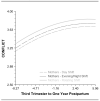Shift Work, Role Overload, and the Transition to Parenthood
- PMID: 20216932
- PMCID: PMC2834316
- DOI: 10.1111/j.1741-3737.2006.00349.x
Shift Work, Role Overload, and the Transition to Parenthood
Abstract
This article examines how the work hours, work schedules, and role overload of working-class couples are related to depressive symptoms and relationship conflict across the transition to parenthood. Data are from 132 dual-earner couples interviewed 5 times across the transition. Multilevel modeling analyses revealed that working evening or night shifts, as opposed to day shifts, was related to higher levels of depressive symptoms. For mothers only, working rotating shifts predicted relationship conflict. Increases in role overload were positively related to both depression and conflict; working a nonday shift explained variance in depression and conflict above and beyond role overload. Results suggest that for new parents, working nonday shifts may be a risk factor for depressive symptoms and relationship conflict.
Figures
Similar articles
-
How does working nonstandard hours impact psychological resources important for parental functioning? Evidence from an Australian longitudinal cohort study.SSM Popul Health. 2021 Sep 24;16:100931. doi: 10.1016/j.ssmph.2021.100931. eCollection 2021 Dec. SSM Popul Health. 2021. PMID: 34621976 Free PMC article.
-
Division of Household and Childcare Labor and Relationship Conflict Among Low-Income New Parents.Sex Roles. 2017 Mar;76(5):319-333. doi: 10.1007/s11199-016-0604-3. Epub 2016 Mar 11. Sex Roles. 2017. PMID: 28348454 Free PMC article.
-
Objective working hour characteristics and work-life conflict among hospital employees in the Finnish public sector study.Chronobiol Int. 2017;34(7):876-885. doi: 10.1080/07420528.2017.1329206. Epub 2017 Jun 7. Chronobiol Int. 2017. PMID: 28590149
-
Updating the "Risk Index": A systematic review and meta-analysis of occupational injuries and work schedule characteristics.Chronobiol Int. 2017;34(10):1423-1438. doi: 10.1080/07420528.2017.1367305. Epub 2017 Oct 24. Chronobiol Int. 2017. PMID: 29064297
-
Influence of rotating shifts and fixed night shifts on sleep quality of nurses of different ages: a systematic literature review and meta-analysis.Chronobiol Int. 2021 Oct;38(10):1384-1396. doi: 10.1080/07420528.2021.1931273. Epub 2021 May 31. Chronobiol Int. 2021. PMID: 34056959
Cited by
-
Association between occupational stressors and type 2 diabetes among Chinese police officers: a 4-year follow-up study in Tianjin, China.Int Arch Occup Environ Health. 2016 Feb;89(2):277-88. doi: 10.1007/s00420-015-1071-9. Epub 2015 Jul 14. Int Arch Occup Environ Health. 2016. PMID: 26168715
-
The Before Baby Relationship Checkup: A Couples-Based Intervention to Reduce Relationship Risk Factors for Perinatal Mood and Anxiety Disorders.J Clin Psychol Med Settings. 2022 Jun;29(2):295-309. doi: 10.1007/s10880-021-09819-8. Epub 2021 Oct 6. J Clin Psychol Med Settings. 2022. PMID: 34617155
-
Independent and joint trajectories of depression and anxiety symptoms among Chinese male sailors throughout a prolonged non-24-h rotating shift schedule at sea: a parallel-process growth mixture modeling approach.BMC Psychiatry. 2023 Dec 11;23(1):934. doi: 10.1186/s12888-023-05389-1. BMC Psychiatry. 2023. PMID: 38082416 Free PMC article.
-
Circadian misalignment and health.Int Rev Psychiatry. 2014 Apr;26(2):139-54. doi: 10.3109/09540261.2014.911149. Int Rev Psychiatry. 2014. PMID: 24892891 Free PMC article. Review.
-
Effects of Adolescent Childbearing on Latino Siblings: Changes in Family Dynamics and Feelings Toward the Teen Mother.Hisp J Behav Sci. 2011 Nov 1;33(4):10.1177/0739986311423368. doi: 10.1177/0739986311423368. Hisp J Behav Sci. 2011. PMID: 24285914 Free PMC article.
References
-
- Ballard DR. Postnatal depression in fathers. International Review of Psychiatry. 1996;8:65–71.
-
- Barling J. Employment, stress, and family functioning. Wiley; New York: 1990.
-
- Barnett RC, Raudenbush SW, Brennan RT, Pleck JH, Marshall NL. Change in job and marital experiences and change in psychological distress: A longitudinal study of dual-earner couples. Journal of Personality and Social Psychology. 1995;69:839–850. - PubMed
-
- Beers TM. Flexible schedules and shift work: Replacing the “9 to 5” workday. Monthly Labor Review. 2000;123:33–40.
-
- Belsky J, Rovine M. Patterns of marital change across the transition to parenthood: Pregnancy to three years postpartum. Journal of Marriage and the Family. 1990;52:5–19.
Grants and funding
LinkOut - more resources
Full Text Sources


